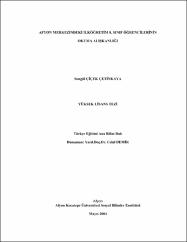Afyon Merkezindeki İlköğretim 8. Sınıf Öğrencilerinin Okuma Alışkanlığı
Özet
Bu araştırma, Afyon Merkezindeki İlköğretim 8. sınıfa giden öğrencilerin okuma alışkanlıklarını incelemek amacıyla plânlanmıştır. Araştırmada sosyo-ekonomik düzey (S.E.D.)in, cinsiyetin ve son bir yılda okunan kitap sayısının öğrencilerin okuma alışkanlık-ları üzerine etkisi incelenmiştir.
Araştırmanın örneklemini Alt Sosyo Ekonomik Düzeydeki Methiye Dumlu İlköğre-tim Okulu ve Salim Pancar İlköğretim Okulundan, Orta S.E.D.deki Gedik Ahmet Paşa İl-köğretim Okulu ve Hüseyin Sümer İlköğretim Okulundan ve Üst S.E.D.deki Merkez Ata-türk İlköğretim Okulu ve Hoca Ahmet Yesevi İlköğretim Okulundan 80’er öğrenci olmak üzere, 3 farklı sosyo-ekonomik düzeyden 240 öğrenci oluşturmaktadır. Öğrenciler, cinsi-yetlerine göre eşit dağılım göstermektedir. Örnekleme alınan tüm öğrencilere geliştirilmiş olan 26 soruluk bir Anket Formu uygulanmıştır. Anket formu öğrencilerin okuma alışkan-lıkları, ailelerin okuma alışkanlıkları, çocukların kitap edinme alışkanlıkları ve kütüphane kullanma alışkanlıkları ile ilgili geliştirilmiş sorulardan oluşmuştur. Anket formu, bizzat araştırmacının kendisi tarafından öğrencilere uygulanmıştır. Toplanan veriler sosyo-ekonomik düzey, cinsiyet ve son bir yılda okunan kitap sayısına göre tablolaştırılmıştır. Tablolar göz sayılarına ve değerlerine göre Ki-Kare (X²) ve Fisher Kesin Ki-Kare istatistik-sel testleriyle analiz edilmiştir.
Yapılan analizler sonucunda, öğrencilerin son bir yılda okudukları kitap sayısında sosyo-ekonomik düzey ve cinsiyetin etkili olduğu görülmüştür.
Öğrencilerin kitap seçiminde dikkat ettiği hususlar, okuma kitaplarını temin etme biçimleri, evinde okuyabileceği kitabın bulunup bulunamaması, gazete okuma sıklıkları, okuma kitabı seçerken en çok tavsiyesine uydukları kişi ya da kişiler, anne-babaların ve abla / ağabeylerin okuma sıklıklarında sosyo-ekonomik düzey etkili olurken, cinsiyet faktörü ve son bir yılda okunan kitap sayısı etkili olmamıştır.
Öğrencilerin kütüphanelerden yararlanma alışkanlıklarında sosyo-ekonomik düzey ve cinsiyet etkili olmamıştır. Öğrencilerin evlerine düzenli olarak bir gazetenin gelmesi ve ailenin boş zamanlarında okuması için çocuğuna kitap almasında sosyo-ekonomik düzey ve son bir yılda okunan kitap sayısı etkili olurken, cinsiyet etkili olmamıştır. This research is planned to examine the reading habits of the students who are in 8th class of primary school in the centre of Afyon. In the research, the effect of the socio-economic level, educational level of parents, gender, ways of getting books and amount of books that are read in a last year are examined on the reading habits of the students.
We chose the sampling from three different socio-economic level of 240 students. We chose 80 students from each socio-economic level. The Methiye Dumlu Primary School and Salim Pancar Primary School have a low socio-economic level, Gedik Ahmet Paşa Primary School and Hüseyin Sümer Primary School have a middle socio-economic and finally Merkez Atatürk Primary School and Hoca Ahmet Yesevi Primary School have a high socio-economic level. The students are distrubuted equally according to their genders. A survey has progressed 26 questions was taken to these students. The survey has progressed questions about the reading habits of students, the reading habits of families, the habit of getting books and the habit of using library. The survey was taken directly by the master-student. The values were illustrated according to socio-economic levels, gender and amount of books that are read in a last year. The tables were analyzed according to amount of eyes and results by Ki-Kare (X2) and Fisher Exact statistical tests.
Thrughout the analysis, it was seen that socio-economic level and gender play a role on amount of books that are read in a last year.
The points when students are choosing a book, the style of getting reading books, whether there is a book that she / he can read at home, the frequency of reading newspaper, noticing advices when they choose a book, the frequency of reading their parents, elder brothers and sisters were effective on socio-economic level, but gender and the amount of books that are read in a last year weren’t effective on getting read habits.
Using library wasn’t effected by socio-economic level and gender. Socio-economic level and the amount of books that are read in a last year are effective on getting regularly at least a daily newspaper and buying books for children when they have spare time, on the other hand, gender isn’t.
Bağlantı
http://hdl.handle.net/11630/2837Koleksiyonlar
- Yüksek Lisans Tezleri [1639]



















